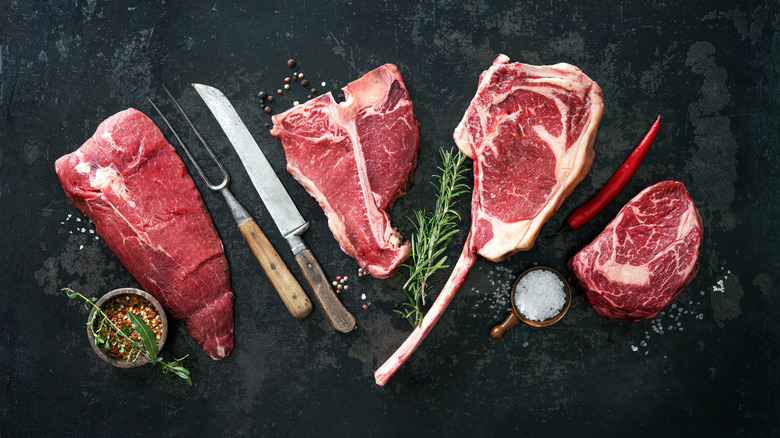Surprising Health Benefits Of Red Meat
Red meat has been on the chopping block, literally and figuratively, for a long time. It is, still, one of the most controversial foods for researchers and nutritionists alike. We've all heard that eating too much red meat (i.e. meat that comes from mammals, like beef, pork, lamb, or veal) can raise our blood pressure or lead to cancer or heart disease. How often have you looked at a bacon double cheeseburger and thought, "That's a heart attack waiting to happen!"? Well, before you give up on red meat for good, read on. There are some great reasons to keep on enjoying it as a part of a healthy diet.
First of all, lean red meat is full of important vitamins, minerals, and protein. A 4-ounce serving of lean beef strip steak contains about 26 grams of high-quality protein, which is roughly half the recommended daily amount for most people. It's also a good source of heme iron, which is vital for making healthy red blood cells that carry oxygen throughout the body, and is absorbed into the body much more easily than iron from plant sources. Allison Baker, vice president of business development at Baze, a personalized nutrition company, explains "Iron is a critical micronutrient for everything from cellular oxygen transport to healthy skin and nails" (via LiveStrong).
Lean red meat is nutrient-rich
Red meat is also an excellent source of zinc, which is important for a healthy immune system and brain function, and a variety of B vitamins — especially vitamin B12, which can be hard to get in adequate amounts from plant-based sources alone (via LiveStrong).
Much of the research examining the link between red meat and detrimental health outcomes has clumsily lumped lean, unprocessed red meat in the same study group as processed red meats like bacon, sausage, and ham (via Healthline). Many of these studies have found a solid association between the consumption of red processed meats and conditions such as heart disease, diabetes, and some cancers. But when lean red meat is studied on its own, the connection to negative health problems becomes much weaker, and many studies have found no association at all between lean red meat and heart disease or cancer.
Shalene McNeil, executive director of nutrition research for the National Cattlemen's Beef Association, notes, "Calorie for calorie, beef is one of the most nutrient-rich foods. One 3-ounce serving of lean beef contributes only 180 calories, but you get 10 essential nutrients" (via Web MD).


